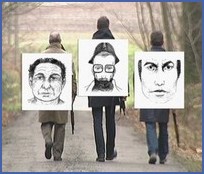| | | Richard L. Holm |  |
| | | Auteur | Message |
|---|
pierre
Nombre de messages : 1067
Localisation : charleroi
Date d'inscription : 30/08/2006
 |  Sujet: Richard L. Holm Sujet: Richard L. Holm  Mar 4 Fév 2020 - 19:49 Mar 4 Fév 2020 - 19:49 | |
| 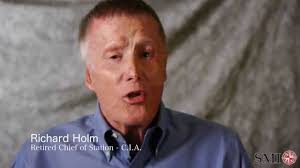 WIKIPEDIA 02 2020 Richard L. Holm, surnommé Dick Holm, est un agent de la CIA qui servit sous treize directeurs d'agence successifs et fut décoré de la plus haute médaille de l'agence de Langley, la Distinguished Intelligence Medal. Après avoir participé au soutien de la guérilla Hmong du général Vang Pao lors de la guerre civile laotienne, pendant la guerre du Viêt Nam, il travaille au Zaïre, à Hong Kong puis à Paris, où il est nommé chef de poste de la CIA. Il est expulsé de France en 1995, après que Charles Pasqua a révélé une affaire d'espionnage économique menée par la CIA contre les intérêts français, et contraint de prendre une retraite anticipée. Il travaillera ensuite à Hong Kong et Paris, et participa notamment à la traque contre Carlos. Dans les années 1980, il a été directeur du groupe de lutte contre le terrorisme à la CIA, où il a restructuré et élargi le personnel et les programmes visant à lutter contre la progression globale des menaces terroristes, et il a coordonné la planification de la sécurité pour les Jeux olympiques d'été de 1984 à Los Angeles. L'affaire de l'espionnage économique en FranceDick Holm termine sa carrière en tant que chef de poste de la CIA à Paris, poste détenu de 1984 à 1989 par Charles Cogan. En 1995, il est expulsé par le gouvernement français, en compagnie de quatre supposés diplomates américaines, à la suite de la découverte d'une affaire d'espionnage économique, publiquement révélée en février 1995 par Charles Pasqua. Au même moment, la France rivalisait avec Washington au sujet de la politique à mener en Irak après la première guerre du Golfe (Pasqua lui-même sera plus tard soupçonné d'avoir été impliqué dans l'affaire Pétrole contre nourriture contournant l'embargo contre l'Irak). Selon le rapport classifié de l'inspecteur général de la CIA (en), tel qu'exposé par le New York Times, Dick Holm aurait d'une part dissimulé de larges pans de ses activités à l'ambassadeur Pamela Harriman (femme de William Harriman), et aurait aussi autorisé une de ses agentes, impliquée dans l'espionnage des intérêts français, à poursuivre sa relation amoureuse avec le responsable français qu'elle devait épier. C'est cette relation amoureuse qui conduisit à la découverte de l'opération d'espionnage, qui visait tant des firmes françaises que les négociations internationales sur le commerce, menées notamment au sein de l'OMC. Ce scandale conduisit aussi à mettre au placard Joseph DeTrani, le responsable de la CIA en Europe. Le New York Times, qui indiquait que le directeur de la CIA James Woolsey avait fait de l'espionnage économique une priorité, affirmait également que la France s'était activement engagée dans l'espionnage des hommes d'affaires américains en transit en France.
Dernière édition par pierre le Mar 4 Fév 2020 - 20:17, édité 3 fois |
|   | | pierre
Nombre de messages : 1067
Localisation : charleroi
Date d'inscription : 30/08/2006
 |  Sujet: Re: Richard L. Holm Sujet: Re: Richard L. Holm  Mar 4 Fév 2020 - 19:57 Mar 4 Fév 2020 - 19:57 | |
| Herve a écrit:
Voici une réaction de Peter van Haperen...
Si ce que dit Richard L. Holm est bien relatif aux tueries et aux CCC, l'arrêt de l' "opération" est lié à sa décision de tout stopper en janvier 1986.
Het gaat zowel over de Bende als de CCC. Dat was ook de reden dat Armfelt op stel en sprong, met zijn gezin België moest verlaten. Alles dreigde uit te komen. Ik heb dat in een vorige mail al aangegeven. "Kijk eens wat er allemaal gebeurde begin 1986". Alle losse eindjes moesten opgeruimd worden.
(traduction)
Il s'agit à la fois de la bande et des CCC. C'est aussi la raison pour laquelle Armfelt a dû quitter la Belgique avec sa famille. Tout menaçait de sortir. Je l'ai déjà indiqué dans un e-mail précédent. "Regardez ce qui s'est passé au début de 1986". Toutes les extrémités libres devaient être "mises en ordre" (nettoyées?).
Richard L. Holm est devenu chef de station de la CIA à Bruxelles à l'été 1985.
Il dit que "l'opération" (très probablement CCC et tueries du Brabant) avait commencé plus d'un an auparavant et qu'il y a mis fin en janvier 1986.
Il a bien entendu été préparé à son nouveau poste en Belgique (notamment sur cette "opération") et était par ailleurs venu "en visiteur" en Belgique quelques mois auparavant.
Il faudrait notamment s'intéresser à son prédécesseur (un personnage très peu apprécié).
Le chef de station de la CIA à Bruxelles couvrait aussi la CEE et l'OTAN.
Richard L. Holm parle de ses contacts avec Raymond Van Calster (SGR-SDRA) et Albert Raes (Sûreté de l'Etat). Ces deux derniers étaient bien au courant des réseaux "stay-behind" belges.
Si "l'opération" a commencé en 1984, elle a pu couvrir les CCC et la seconde vague...
Dernière édition par pierre le Mar 4 Fév 2020 - 20:17, édité 1 fois |
|   | | pierre
Nombre de messages : 1067
Localisation : charleroi
Date d'inscription : 30/08/2006
 |  Sujet: Re: Richard L. Holm Sujet: Re: Richard L. Holm  Mar 4 Fév 2020 - 20:02 Mar 4 Fév 2020 - 20:02 | |
| |
|   | | HERVE
Nombre de messages : 21423
Date d'inscription : 08/12/2009
 |  Sujet: Re: Richard L. Holm Sujet: Re: Richard L. Holm  Lun 6 Juin 2022 - 10:22 Lun 6 Juin 2022 - 10:22 | |
|
Dans l'autobiographie de Richard L. Holm, il est aussi question de "Tony Poe" qu'il a rencontré dans les années 1960...
|
|   | | HERVE
Nombre de messages : 21423
Date d'inscription : 08/12/2009
 |  Sujet: Re: Richard L. Holm Sujet: Re: Richard L. Holm  Sam 11 Juin 2022 - 11:44 Sam 11 Juin 2022 - 11:44 | |
| Counterspy, Volume 4Committee for Action/Research on the Intelligence Community (CARIC), 1980  |
|   | | HERVE
Nombre de messages : 21423
Date d'inscription : 08/12/2009
 |  Sujet: Re: Richard L. Holm Sujet: Re: Richard L. Holm  Sam 11 Juin 2022 - 11:49 Sam 11 Juin 2022 - 11:49 | |
| https://altgov2.org/wp-content/uploads/2022/05/CounterSpy_5-2.pdf 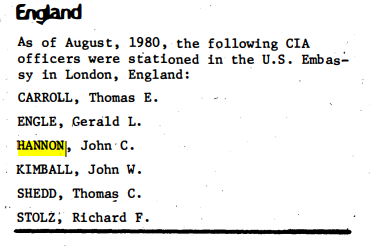 |
|   | | HERVE
Nombre de messages : 21423
Date d'inscription : 08/12/2009
 |  Sujet: Re: Richard L. Holm Sujet: Re: Richard L. Holm  Mar 9 Aoû 2022 - 11:34 Mar 9 Aoû 2022 - 11:34 | |
| Selon http://cia-spotters.blogspot.com/2014/08/tres-prochainement.html le prédécesseur de Richard L. Holm à Bruxelles serait John C. Hannon. 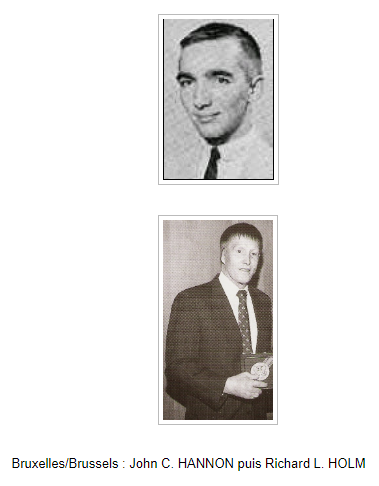 mais il est aussi question de Robert D. Aitken : https://www.invissin.ru/upload/CAQ/14-15,%20Oct%201981.pdf 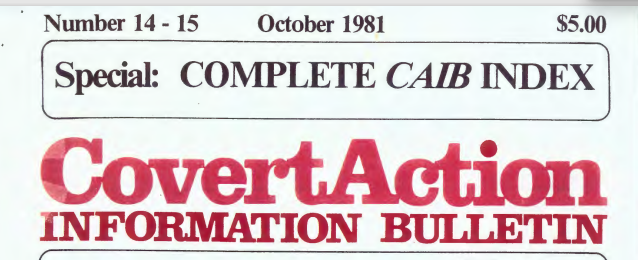 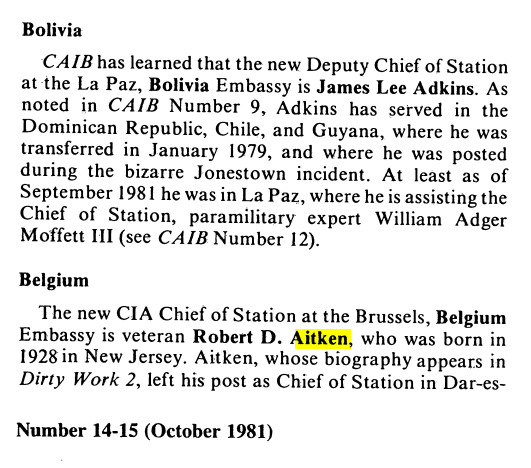 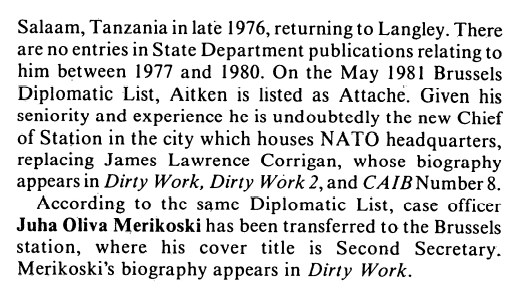 _ _ _ Intelligence Identities Protection Act, S. 2216: Hearing Before the ... United States. Congress. Senate. Committee on the Judiciary  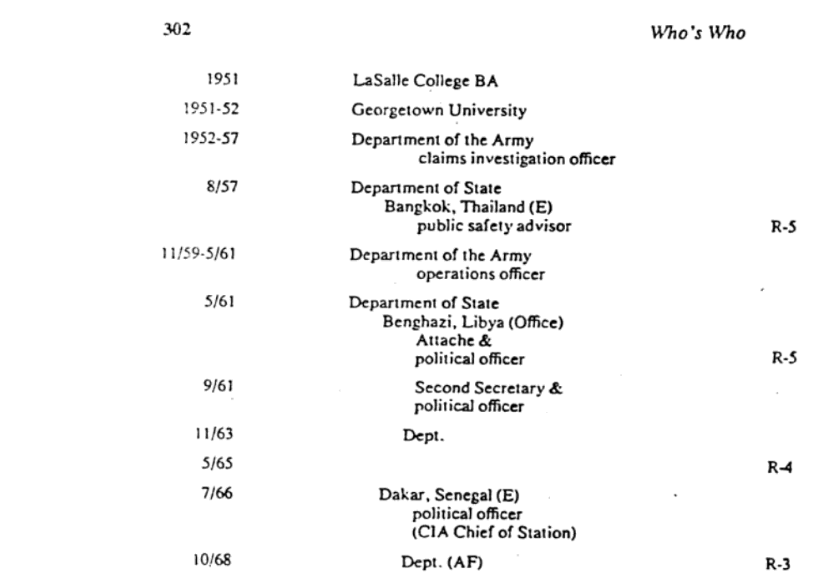  |
|   | | HERVE
Nombre de messages : 21423
Date d'inscription : 08/12/2009
 |  Sujet: Re: Richard L. Holm Sujet: Re: Richard L. Holm  Jeu 11 Aoû 2022 - 13:31 Jeu 11 Aoû 2022 - 13:31 | |
| https://1960.dartmouth.org/s/1353/images/gid313/editor_documents/1960_book_final__20100405_1700_loqr_0.pdf?gid=313&pgid=61&sessionid=1849668f-743a-4110-97c4-55e1b42e5886&cc=1 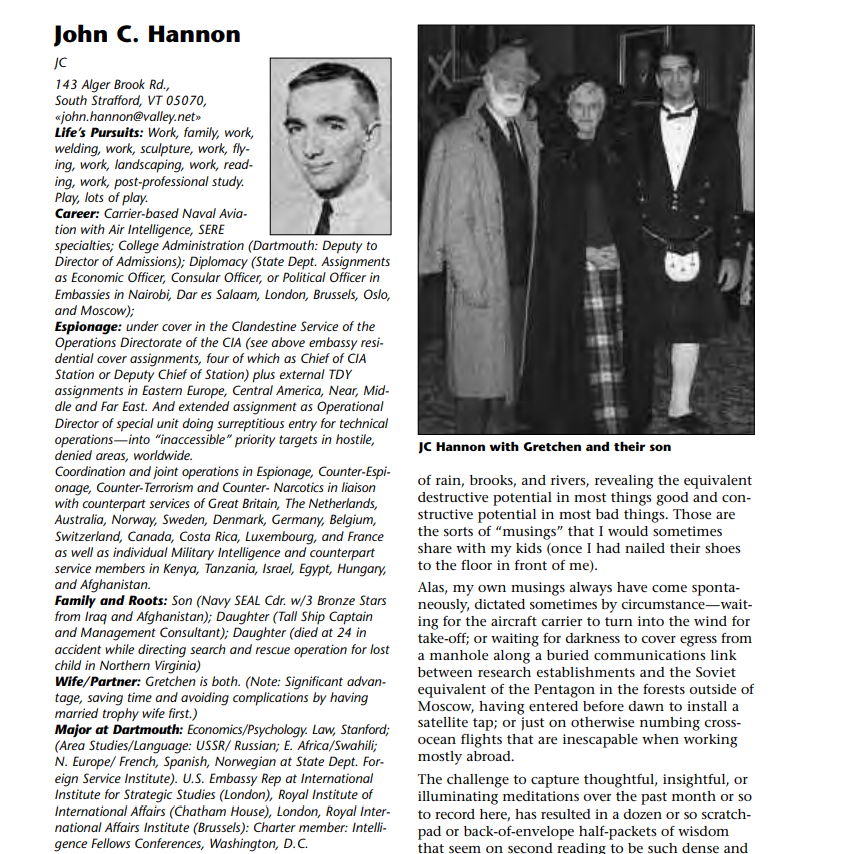 |
|   | | HERVE
Nombre de messages : 21423
Date d'inscription : 08/12/2009
 |  Sujet: Re: Richard L. Holm Sujet: Re: Richard L. Holm  Jeu 11 Aoû 2022 - 13:53 Jeu 11 Aoû 2022 - 13:53 | |
| Company Confessions: Secrets, Memoirs, and the CIAChristopher Moran 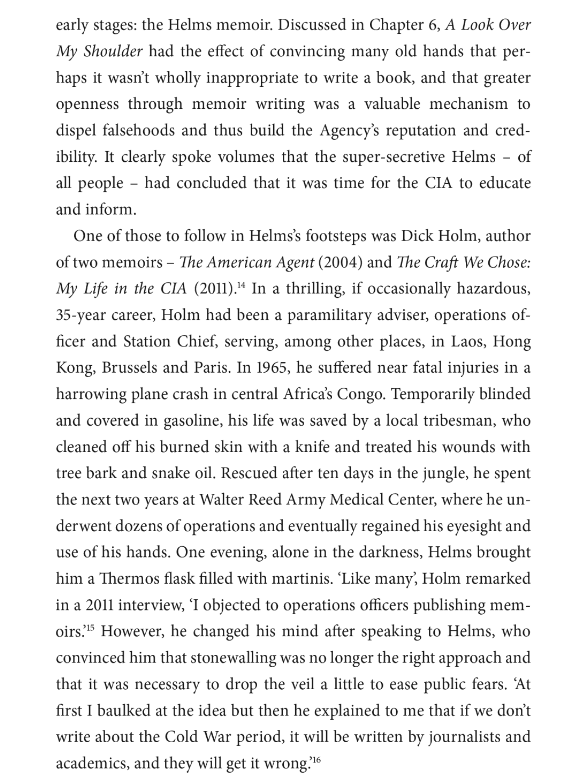 |
|   | | HERVE
Nombre de messages : 21423
Date d'inscription : 08/12/2009
 |  Sujet: Re: Richard L. Holm Sujet: Re: Richard L. Holm  Jeu 11 Aoû 2022 - 14:05 Jeu 11 Aoû 2022 - 14:05 | |
| Il est à mon avis très probable que Richard L. Holm parle des tueries du Brabant dans ce qui suit (extraits de ses deux livres autobiographiques). C'est lui qui y aurait mis fin. The American Agent: My Life in the CIA Richard Holm 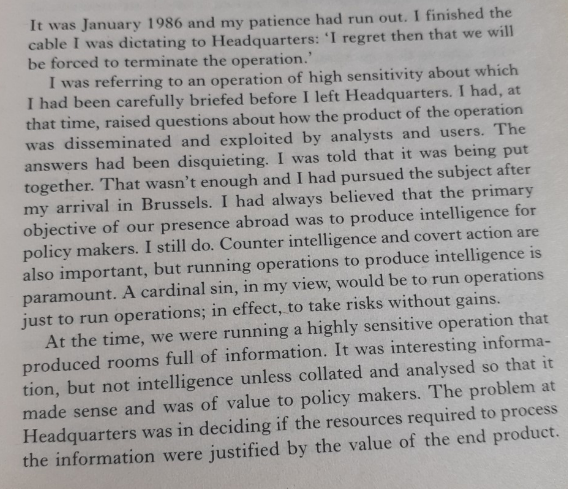 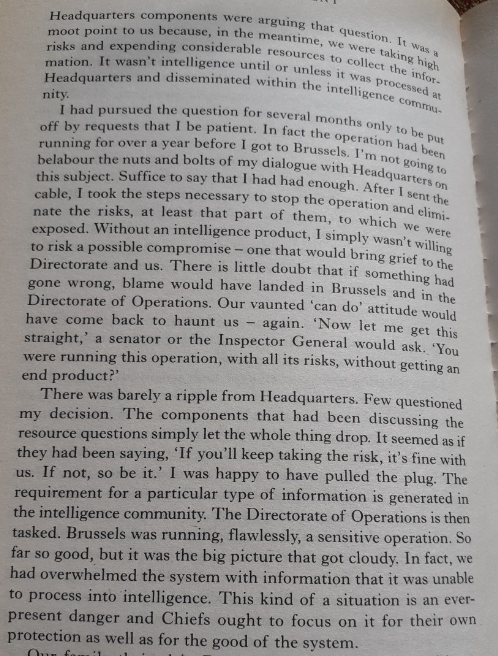 The Craft We Chose: My Life in the CIA The Craft We Chose: My Life in the CIARichard Holm 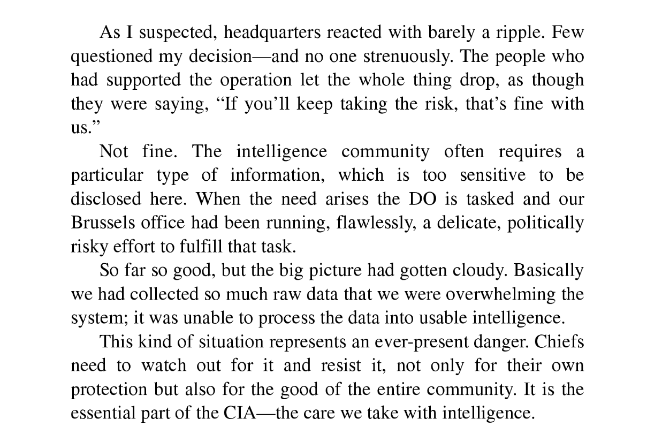 |
|   | | HERVE
Nombre de messages : 21423
Date d'inscription : 08/12/2009
 |  Sujet: Re: Richard L. Holm Sujet: Re: Richard L. Holm  Ven 12 Aoû 2022 - 16:40 Ven 12 Aoû 2022 - 16:40 | |
| Pour information, Richard L. Holm est cité dans VeilBob Woodward 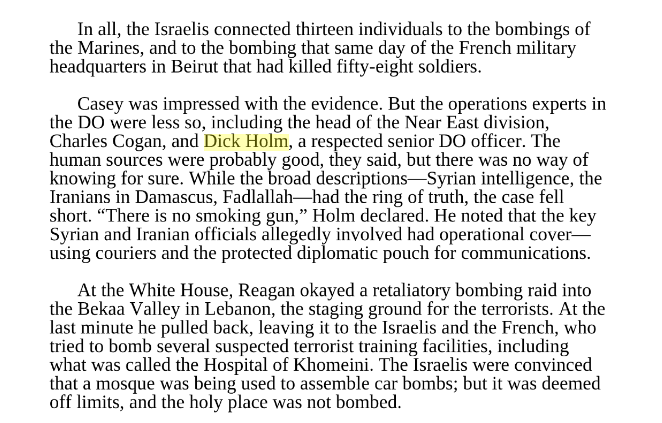 |
|   | | HERVE
Nombre de messages : 21423
Date d'inscription : 08/12/2009
 |  Sujet: Re: Richard L. Holm Sujet: Re: Richard L. Holm  Ven 12 Aoû 2022 - 17:07 Ven 12 Aoû 2022 - 17:07 | |
|
Pour information sur William Casey :
Mr. Casey, after serving as chief of secret intelligence in Europe for the Office of Strategic Services in World War II, (...)
Directed Spies in the War
From 1941 to 1946 Mr. Casey served with the Army Intelligence and the Office of Strategic Services. He directed O.S.S. spies from a base in London. (...)
_
https://www.nytimes.com/1987/05/07/obituaries/william-casey-ex-cia-head-is-dead-at-74.html
WILLIAM CASEY, EX-C.I.A. HEAD, IS DEAD AT 74
May 7, 1987
Before joining the Reagan Administration, Mr. Casey, a Queens-born lawyer, had been chairman of the Securities and Exchange Commission and an Under Secretary of State. He was a key campaign adviser to Ronald Reagan.
Mr. Casey suffered two seizures and was hospitalized in Washington last Dec. 15, the day before he was to testify to a Senate panel about the Central Intelligence Agency's role in the sale of American arms to Iran. Surgery for Brain Tumor
He underwent surgery three days later for removal of a malignant brain tumor, and it was later reported that he had been under treatment for cancer of the prostate gland for months. After several weeks in the hospital, Mr. Casey resigned his C.I.A. post.
Dennis Connors, a vice president at the Glen Cove hospital, issued a statement yesterday saying, ''The immediate cause of death was aspiration pneumonia as a result of a central nervous system lymphoma.'' Mr. Casey was admitted to the hospital April 25.
The diagnosis of aspiration pneumonia could mean, among various possibilities, that Mr. Casey had inhaled food or food particles into his lungs that set up a toxic chemical reaction, a physician not connected with the case said yesterday. A central nervous system lymphoma is a rare tumor of the brain and central nervous system, evidently the brain tumor for which Mr. Casey had surgery late last year at Georgetown Hospital in Washington.
Difficulty in Swallowing
The physician said the brain tumor, and the damage it caused, might have led Mr. Casey to have difficulty in swallowing properly.
Renee Paley, another Glen Cove hospital spokesman, said yesterday that ''the hospital is not giving any more information'' about the cause of death. He also said Mr. Casey's personal physician, Dr. Shirley Andersen, did not want to comment on the cause of death.
Mr. Casey, after serving as chief of secret intelligence in Europe for the Office of Strategic Services in World War II, became a multimillionaire in private life, first as a packager and processor of legal and economic information for corporate customers and later mainly as a venture capitalist. He was the manager of Mr. Reagan's Presidential campaign in 1980 and became Director of Central Intelligence in 1981.
A Tribute From Reagan
The President, in a tribute to Mr. Casey, said: ''His nation and all those who love freedom honor today the name and memory of Bill Casey. In addition to crediting him with rebuilding America's intelligence capability, history will note the brilliance of his mind and strategic vision, his passionate commitment to the cause of freedom and his unhesitating willingness to make personal sacrifices for the sake of that cause and his country.''
As Director of Central Intelligence, Mr. Casey wielded wide-ranging authority over all United States intelligence-gathering agencies.
He became the first Director in 16 years to stay on from one Presidential term to the next. ''I feel that I'm leading and I feel that I'm on top of all facets of the job,'' he said early in Mr. Reagan's second term. ''I have a capacity to size up a situation once I get the facts, and to make decisions.''
Yet furor and controversy repeatedly swirled around him.
General Secord's Testimony
At the Congressional hearing Tuesday the leadoff witness, Richard V. Secord, said that in addition to Mr. Casey, officials of the C.I.A. and the State Department aided in efforts to provide weapons to the Nicaraguan rebels.
The witness, a retired Air Force major general, also testified that he had been encouraged in his efforts by Mr. Casey and that he and Mr. Casey had conferred three times.
General Secord did not say precisely what sort of intelligence he had received from Mr. Casey. But General Secord termed it disappointing in quantity, and observed, ''I was never able to get the professional intelligence I was accustomed to having.''
He reported that, under Mr. Casey, high-ranking C.I.A. agents in Honduras and Costa Rica had provided him with intelligence data or other assistance.
Under Fire From Congress
Mr. Casey, who was regularly under fire from some members of Congress in his tenure at the C.I.A., came in for strong criticism last December. He drew the attack for having evidently given C.I.A. staff members great latitude to circumvent a 1984 Congressional prohibition on giving aid to the contras fighting the Marxist Government of Nicaragua.
Through it all, Mr. Casey retained the President's confidence. He became the first Director of Central Intelligence to take a place at the White House table as a fully participating Cabinet member. He also became nationally known, recognizable by his stooped physique, his heavy glasses and his indistinct speech, Mr. Casey's earlier high posts were in the Nixon and Ford Administrations. He was a vigorous chairman of the Securities and Exchange Commission from 1971 to 1973, overseeing efforts toward improved regulation of the issuing and trading of stocks. He served as Under Secretary of State for economic affairs in 1973 and 1974 and as president and chairman of the Export-Import Bank in 1974 and 1975.
Under President Ford, in 1976, he also served on the Foreign Intelligence Advisory Board, a presidium of the United States intelligence community.
Military and Political Action
After Mr. Reagan took office in 1981 he sought, through Mr. Casey, to build up the C.I.A.'s ability to take military and political action outside the United States. The agency stepped up its support for various anti-Communist insurgent organizations in developing countries, organizations that were close to his heart.
''More than a quarter of a million people have taken up arms against Communist oppression,'' Mr. Casey declared in a speech late in 1984, referring to rebels in Nicaragua, Afghanistan, Angola, Cambodia and Ethiopia.
It was also under his leadership that the agency began to provide the contras with military assistance and clandestine instruction, before such aid was rendered illegal by Congress in 1984.
Mr. Casey was criticized by some members of Congress as evidently lacking knowledge about the diversion to the Nicaraguan rebels, through the efforts of Lieut. Col. Oliver L. North of the National Security Council staff, of proceeds from the disputed sale of arms to Iran.
Focus on Financial Affairs
Earlier, Mr. Casey was a focus of controversy as his own financial affairs came under scrutiny. The Senate Select Committee on Intelligence became concerned about financial assets that he had not disclosed before his confirmation hearings.
He was also involved in controversy over such intelligence undertakings as the laying of mines in Nicaraguan harbors and the compiling of an advisory textbook for the contras on ''selective use of violence'' against civilian officials.
Reagan Administration officials said the mining operation bore the stamp of Mr. Casey's hard-driving management style, a style his critics often termed confrontational. At the same time, after three years at the helm of the intelligence agency, Mr. Casey was praised for improving its analytical work and making it more up to date.
As the debate about the sale of arms to Iran grew, critics called for Mr. Casey to resign. They contended either that his ignorance of the matter was reprehensible or that he had played a greater role in it than he had acknowledged.
Key Memo Laid to Casey
When the American sale of arms to Iran first became public knowledge last November, it was sharply criticized as a deal for the return of hostages, something the President had vowed he would not make.
Mr. Reagan said he had sanctioned the arms shipments only as part of a diplomatic effort to get in touch with ''moderate'' elements in Iran who might help to undermine the radical leadership of Ayatollah Ruhollah Khomeini.
But late in December, The New York Times quoted a high, unidentified United States official as saying that Mr. Casey had written a memorandum, at the outset of the selling of American weapons to Iran, that called the undertaking an exchange of weapons for hostages.
The official also said that in the memorandum, written about a year earlier, Mr. Casey had said that if the then-secret project became known, Mr. Reagan was ready to describe it as a political overture to Iran.
This official's assertion came after Mr. Casey was hospitalized and could not comment.
Before he became ill Mr. Casey appeared four times before the House and Senate Intelligence and Foreign Affairs Committees in inquiries into the intelligency agency's part in the sale of arms to Iran.
What Is Known of C.I.A. Role
Much is not known about the agency's role and about what Mr. Casey told Congress. But Congressional testimony and interviews with Government officials and others have yielded the following account:
In May 1985, Graham Fuller, the chairman of the National Intelligence council of the C.I.A., wrote a paper setting out the idea of an opening to Iran as a way of forestalling Soviet steps in the area. The idea was then taken up by members of the National Security Council.
In November of that year the C.I.A. became involved in the shipping of arms to Iran, but it was said that Colonel North, the National Security Council staff member, had described the shipment as oil-industry equipment. When the agency subsequently learned that it had shipped arms, Mr. Casey's Deputy Director, John N. McMahon, said the C.I.A. would not provide additional help unless Mr. Reagan gave his formal approval.
Mr. Casey advocated further shipments, and the President signed a directive approving them on Jan. 17, 1986.
A Meeting With Poindexter
Mr. Casey said later that after a talk last October with Roy Furmark, a former business associate, he began to suspect that proceeds from the Iran weapons deliveries might have been secretly relayed to the Nicaraguan insurgents.
Mr. Casey then went to Vice Adm. John M. Poindexter, then the President's national security adviser. Subsequent accounts differed as to what Mr. Casey told the admiral in an inconclusive meeting. But Mr. Casey indicated to reporters on Dec. 11 that he had first received definite information about the diversions in November. The matter was made public by Attorney General Edwin Meese 3d on Nov. 25.
By last December, when Mr. Casey testified before Congress on the Iran-contra affair, he had spent half a century as a student, business information analyst, wartime intelligence operative, New York lawyer and Government official concerning himself with the flow, analysis and presentation of information and arguments.
His skill and energy took him from Queens to ownership of estates in Palm Beach, Fla., Washington and Roslyn Harbor, L.I.
William Joseph Casey was born on March 13, 1913, in Elmhurst, Queens, the son of William J. and Blanche La Vigne Casey. He earned a bachelor's degree at Fordham University in 1934. After graduate work at the Catholic University of America, in Washington, he went on to earn a law degree at St. John's University in 1937.
He then went to work in Washington for the private Research Institute of America, whose activities included making predictions about New Deal legislation. He showed a marked talent for analyzing information useful to business executives.
Directed Spies in the War
From 1941 to 1946 Mr. Casey served with the Army Intelligence and the Office of Strategic Services. He directed O.S.S. spies from a base in London. Recalling that work years later, he said, ''All we could do was pop a guy into Germany with a radio and hope to hear from him.''
In 1948 he became associate general counsel of the Point Four mission to France, the Economic Cooperation Administration. He lectured on tax law at New York University from 1948 to 1962.
As time passed, he grew wealthy initially by compiling legal and economic data of use in the business world, turning out works with such titles as ''Tax Sheltered Investments'' in 1952 and ''Accounting Desk Book'' in 1956. He went on to amass further wealth as an investor.
From 1957 to 1971 he was also a partner, along with the Republican Party leader Leonard Hall, in the New York law firm of Hall, Casey, Dickler & Howley. In those years Mr. Casey took his only stab at electoral politics himself, an effort to win the Republican nomination in the Third Congressional District on Long Island. But he was defeated by the Nassau County Republican organization when Representative Steven B. Derounian, a Goldwater Republican, was renominated. Helped in 1968 Campaign
Mr. Casey wrote and did research for Richard M. Nixon's Presidential campaign in 1968, and in 1969 he helped the new President by setting up the Citizens Committee for Peace with Security, which backed Mr. Nixon's policy on anti-missile weapons.
Later that year Mr. Casey was named a member of the advisory council of the Arms Control and Disarmament Agency. Then, in early 1971, President Nixon named his seasoned supporter to the S.E.C. post.
During his tenure at the Securities and Exchange Commission it undertook important inquiries with the goal of improving its regulatory work, and it pressed on with other projects. In 1972 Mr. Casey's leadership of the S.E.C. was described by Eileen Shanahan, then an economics writer for The New York Times, as including ''much toughness.''
''He has shocked his fellow lawyers by naming some of their group as defendants'' in connection with their clients' alleged frauds, she said, ''and he has forced stockbrokers to live by somewhat stricter rules than many of them really wanted.''
William P. Rogers, Secretary of State from 1969 to 1973, then gave the Under Secretary's post to Mr. Casey, who held it until he became restless soon after Mr. Rogers was succeeded by Henry A. Kissinger. Head of Export-Import Bank
Mr. Casey moved on to head the Export-Import Bank, an independent Government agency charged with facilitating exports of American goods and services. While he was its chairman and president, the bank followed policies that were relatively liberal and promotional compared to those of his successor, Stephen M. DuBrul Jr., a Ford appointee.
From 1976 until 1981, Mr. Casey was affiliated with Mr. Rogers's law firm, Rogers & Wells, which operates in Washington and Manhattan. So influential was Mr. Casey in some political circles in those years that when Mr. Reagan telephoned him in 1979 to ask for political backing, he was the third Presidential aspirant to do so; John B. Connally and George Bush had called earlier.
Mr. Reagan and Mr. Casey conferred and hit it off, and Mr. Casey went on to run Mr. Reagan's 1980 campaign. He encouraged Mr. Reagan to name Mr. Bush as his running mate.
When Mr. Casey emerged as Mr. Reagan's choice as Director of Central Intelligence, he was denounced by some members of Congress as too political because he had run the Presidental campaign.
But Mr. Reagan and Mr. Casey were undeterred. So important did the C.I.A. prove to be in the new President's scheme of things that its appropriations soared 50 percent in the first three Reagan budgets.
Taken Ill at C.I.A. Office
It was cancer that eventually took Mr. Casey out of the center of power, and controversy. The Director fell ill at his office last Dec. 15 and was taken from the C.I.A. headquarters in suburban Langley, Va., to Georgetown University Hospital in the capital.
At first it was reported that Mr. Casey had been taking ''medication that had not been agreeing with him,'' and was ''tired'' when he entered the hospital. But the hospital said later that he had suffered what a ''minor cerebral seizure'' while at his office and a second in the hospital.
Three days later surgeons removed a tumor from the left side of the brain, which the hospital said was ''treatable,'' and later reports said the Director was ''fully conscious and able to sit up in a bedside chair.''
But after a few days people familiar with Mr. Casey's situation indicated that he was indeed in serious condition and that it seemed highly unlikely he would be able to return to his C.I.A. post. Mr. Reagan accepted his resignation on Feb. 2.
Ex-Trustee of Fordham
Mr. Casey was a trustee of Fordham University from 1966 to 1971 and chairman of the International Rescue Committee in 1970 and 1971.
He is survived by his wife, Sophia Kurz Casey, whom he married in 1941, and a daughter, Bernadette Smith of Oyster Bay, L.I.
Mr. Casey's daughter requested yesterday that, in lieu of sending flowers, donations be made to the Willam J. Casey Fund for the Nicaraguan Freedom Fighters.
Mrs. Smith said donations to the fund could be mailed to her father's residence on Glenwood Road in Roslyn Harbor. New York, N.Y.,11576.
A funeral mass will be offered Saturday at 1:45 P.M. at St. Mary's Roman Catholic church in Roslyn Harbor. Presiding will be the Most. Rev. John McGann, Bishop of the diocese of Rockville Centre.
Burial will be at Holy Rood Cemetery in Westbury.
|
|   | | HERVE
Nombre de messages : 21423
Date d'inscription : 08/12/2009
 |  Sujet: Re: Richard L. Holm Sujet: Re: Richard L. Holm  Ven 19 Aoû 2022 - 19:28 Ven 19 Aoû 2022 - 19:28 | |
| Dans l'autobiographie de Richard L. Holm : "In fact the operation had been running for over a year before I got to Brussels". 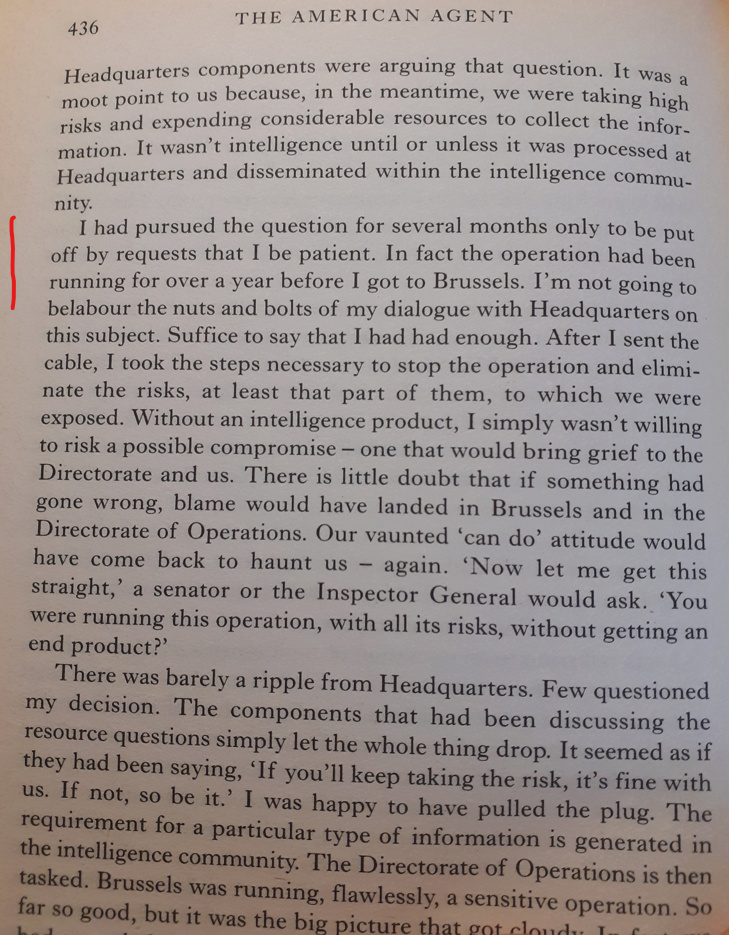 Se pourrait-il que " l' opération " soit la seconde vague ? La question est alors de savoir comment des éléments de la première vague ont pu être réutilisés. _ _ _ Il peut être intéressant de noter que la tension Est-Ouest a atteint un sommet en 1983. https://www.wired.com/2013/05/able-archer-scare/ MAY 16, 2013 3:43 PM New Documents Reveal How a 1980s Nuclear War Scare Became a Full-Blown CrisisOver 10 days in November 1983, the U.S. and the Soviet Union nearly started a nuclear war. Now newly declassified documents reveal just how close we reached a mutual destruction -- because of an exercise. (...) _ _ _ https://nsarchive2.gwu.edu/NSAEBB/NSAEBB426/ The 1983 War Scare: "The Last Paroxysm" of the Cold War Part I (...) https://nsarchive2.gwu.edu/NSAEBB/NSAEBB427/ The 1983 War Scare: "The Last Paroxysm" of the Cold War Part II (...) https://nsarchive2.gwu.edu/NSAEBB/NSAEBB428/ The 1983 War Scare: "The Last Paroxysm" of the Cold War Part III (...) |
|   | | HERVE
Nombre de messages : 21423
Date d'inscription : 08/12/2009
 |  Sujet: Re: Richard L. Holm Sujet: Re: Richard L. Holm  Mar 27 Fév 2024 - 12:31 Mar 27 Fév 2024 - 12:31 | |
|
https://www.newsweek.com/man-who-spied-too-long-176706
The Man Who Spied Too Long
Published Apr 28, 1996 at 8:00 PM EDT
Updated Mar 13, 2010 at 8:41 PM EST
(...)
https://www.newsweek.com/spy-honors-177860
Spy Honors
Published Sep 22, 1996 at 8:00 PM EDT
Updated Mar 13, 2010 at 9:21 PM EST
(...)
|
|   | | HERVE
Nombre de messages : 21423
Date d'inscription : 08/12/2009
 |  Sujet: Re: Richard L. Holm Sujet: Re: Richard L. Holm  Mar 27 Fév 2024 - 13:23 Mar 27 Fév 2024 - 13:23 | |
|
https://www.cia.gov/static/9260ea9fb9da7824977cf6a10ee7f8b9/Recollections-Case-Officer-Laos.pdf
Studies in Intelligence Vol. 47 No. 1 (2003)
Recollections of a Case Officer in Laos, 1962-1964
No Drums, No Bugles
Richard L. Holm
(...)
|
|   | | Contenu sponsorisé
 |  Sujet: Re: Richard L. Holm Sujet: Re: Richard L. Holm  | |
| |
|   | | | | Richard L. Holm |  |
|
| | Permission de ce forum: | Vous ne pouvez pas répondre aux sujets dans ce forum
| |
| |
| |
